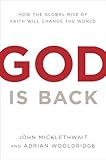What if America is not the exception?
Here's a few salient points from an interview with the Economist's editor in chief John Micklethwait on his new book - God is Back: how the global revival of faith is changing the world.
On Western Europe, not the US, as the exception to the rest of the world. . .
I think, if you look around the world, and in this case I have included Australia within Western Europe, we are the exceptions. What has basically happened throughout America, most of Asia, Africa, Latin America, God is doing well. The reason we wrote the book is because very much from a journalistic perspective, the more we look around the world, the more we saw it challenging the assumption we had been brought up with, which is that the more a modern a country gets, the less religious it gets, the more secular it gets.
On why there are now more Christians in China than members of the Communist Party. . .
One reason is the Government has cleverly hit on the one formula to make religion grow. It's something the ancient Romans did to Christianity, and it was a brilliant way inadvertently to cause religion to grow. The Chinese have set a limit on the number of people that can meet in a place, basically 25. Once you reach 25 people meeting in one of these house churches, which take place in somebody's home, once it's at that level the church has to split and start again. Automatically it's almost a formula for amoeba-like growth.
What's interesting though is as Christianity spreads throughout China, really incredibly quickly. I think China will certainly become the world's biggest Christian country.
On why God is back. . .
Man is essentially quite a theotropic creature. If you leave people to it, give them a decent supply of religions, the chances are they will probably grasp one. It's true everywhere outside that Western Europe-plus-Australian phenomenon.
The second reason is there's a lot of sociological reasons why people would want to be religious. There's a wealth of evidence that religious people are healthier, wealthier and wiser - at least in America. They tend to live longer than other people, they tend to be better educated and they tend to be richer as I indicated earlier. So there's an advantage in hanging out with similar people like that.
On Christianity and Islam in the 21st century. . .
Our guess, which is against the experience of the 20th century, is that Islam will have a tougher 21st century than Christianity, and one reason why is that we think evangelical Christianity, and Christianity in general, have had more the acids of modernity, if you want to call it that, it's been tempered by that, it's easier to get on with it. And Islam faces some limitations in terms of being able to spread around the world, not least the fact that you can't translate the Koran in the same way that you can translate the Bible, and it doesn't have the same degree of flexibility. Obviously it's dangerous to predict anything about religion, but it would seem from our perspective at least that Christianity is the one which is forging ahead.
HT: Dave Lawton


